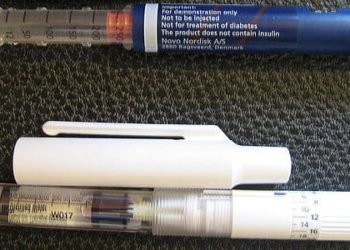#VisualAbstract: Novel macrophage-regulating cream demonstrated superior therapeutic efficacy for the treatment of diabetic foot ulcers compared to standard absorbent dressing
1. Topical application of ON101, a macrophage regulator cream, demonstrated superior therapeutic efficacy in the treatment of diabetic foot ulcers compared to standard absorbent dressing in terms of both complete healing rate and time to complete healing.
2. Therapeutic efficacy of ON101 was sustained in patients with high-risk factors including ulcers that last for more than 6 months, measure greater than 5 cm2, or in patients with high HbA1c levels.
Evidence Rating Level: 1 (Excellent)
Study Rundown: Diabetic foot ulcers (DFUs) are a common complication of chronic diabetes. Current standard treatments focus mainly on local wound care, including debridement, off-loading, infection control, and maintaining a moist environment with dressings, along with adequate glycemic control systemically. Newer drugs focus on restoring the balance between M1/M2-type macrophages that are known to play a critical role in wound healing and frequently dysregulated in patients with delayed healing of DFUs. However, these drugs have not yet been studied in large randomized clinical trials. This multicenter, phase 3 randomized clinical trial sought to evaluate whether topical application of ON101, a macrophage regulator cream, could treat chronic DFUs by comparing it with a standard primary wound care absorbent dressing. The main endpoint of the analysis was the incidence of complete wound healing, defined as complete re-epithelialization at 2 consecutive visits during the 16-week treatment period. Furthermore, data on safety outcomes was collected including the incidences of adverse events, clinical laboratory values, and vital signs. Among 236 patients with DFUs, topical application of ON101 cream post-debridement demonstrated significantly improved wound healing efficacy compared to standard practice using absorbent dressing, including in patients with DFU-related risk factors. These findings suggested that ON101, a cream that regulates M1:M2 macrophage ratio, demonstrated superior therapeutic efficacy in the treatment of DFUs compared to standard absorbent dressing in terms of both complete healing rate and time to complete healing. Additionally, therapeutic efficacy of ON101 was sustained in patients with high-risk factors including ulcers that last for more than 6 months, measure greater than 5 cm2, or in patients with high HbA1c levels. These results suggested that topical application of ON101 represented an active wound healing alternative for primary care of patients with chronic DFUs. A limitation of this study was the lack of masking of the interventions to patients or clinical investigators due to the open-label design of the study, introducing possible biases from the blinded evaluation.
Click to read the study in JAMA Network Open
Relevant Reading: Current challenges and opportunities in the prevention and management of diabetic foot ulcers
In-Depth [randomized controlled trial]: This multicenter, evaluator-blinded, phase 3 randomized clinical trial enrolled 236 patients (175 men [74.2%]; mean [SD] age, 57.0 [10.9] years; mean [SD] glycated hemoglobin level, 8.1% [1.6%]) from 21 centers across the US, China, and Taiwan between November 2012 and May 2020. Eligible patients had DFUs between 1 to 25 cm2 (mean [SD] ulcer area, 4.8 [4.4] cm2) present for at least 4 weeks classified as Wagner grade 1 or 2 and were randomized 1:1 to receive either ON101 cream (n = 122) or absorbent dressing (n = 114) for as long as 16 weeks, with a 12-week follow-up. Overall, complete wound healing was observed in 74 (60.7%) and 40 (35.1%) patients in the ON101 and dressing comparator cohorts respectively during the 16-week treatment period (difference, 25.6%; OR, 2.84; 95%CI, 1.66-4.84; P < .001). Treatment-emergent adverse events occurred in 7 (5.7%) patients in the ON101 cohort vs 5 (4.4%) in the comparator cohort. Lastly, no treatment-related serious adverse events were observed in the ON101 cohort vs 1 (0.9%) in the comparator cohort.
Image: PD
©2021 2 Minute Medicine, Inc. All rights reserved. No works may be reproduced without expressed written consent from 2 Minute Medicine, Inc. Inquire about licensing here. No article should be construed as medical advice and is not intended as such by the authors or by 2 Minute Medicine, Inc.









